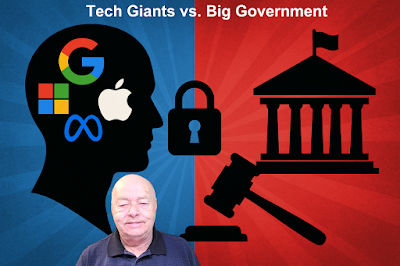Tech Giants vs Big Government – Welcome to the Irony Olympics
This information is also available on my YouTube Channel at: https://youtu.be/Y2TnN51VD5I
If you prefer, you can also listen to this information on my Podcast at: https://open.spotify.com/episode/4myfCwVi6y77zEq56sunx8?si=PIO-kVD1T86WXRdrmub9lQ
Imagine this - You’re at a county fair. One booth is selling popcorn so large, buttery, and dominant that no other popcorn stand has a chance. People grumble, “This is a monopoly!” Meanwhile, the fair’s organizing committee — bloated, slow-moving, and staffed by folks who need three meetings just to agree on napkin colors — insists everything is running just fine.
Welcome to the curious case of modern political irony.
🍏Monopolies, Mega Tech, and the Fight for Fair Play
On one hand, many Democrats (and let’s be honest, some Republicans too) have declared war on tech giants like Google, Meta, Microsoft, and Apple. The reasoning? These companies:
Dominate digital markets with no serious competition.
Buy up startups like Pokémon cards to squash future threats.
Harvest oceans of your personal data.
Shape what you see, think, and sometimes even vote for.
So it makes sense why people are yelling “Monopoly!” louder than a board game night gone sideways.
The rallying cry - brake them up - Spark competition - Protect privacy - Save democracy.
🏛️Meanwhile, in the Land of Big Government -
Now here’s where the irony gets spicy - the same voices demanding Big Tech accountability often defend Big Government from even the lightest reform.
“But wait,” you ask, “isn’t the government a monopoly too — on taxes, regulations, licensing, and slow-moving bureaucracy?”
Bingo.
Sure, government should work for the people — funding schools, roads, and safety nets. But let’s be brutally honest:
Education - Is underfunded, politicized, and often fails to prepare students for life.
Infrastructure - Our bridges and highways are cracking like your aunt’s Thanksgiving gravy. “Shovel-ready” projects tend to stay shovel-ready for decades.
Public services - Slow, redundant, and allergic to modernization. Just try dealing with the DMV or VA without packing snacks.
So when politicians boast about “all the good government does,” most people sigh and ask, “Have you used it lately?”
🤔So What Gives?
Here’s the paradox:
Tech monopolies are private and unchecked — threatening innovation, privacy, and consumer choice.
Government monopolies are public and bloated — wasting time, resources, and taxpayer patience.
Fighting Big Tech is politically trendy. It sounds bold and scores media points. Reforming Big Government - That’s the political equivalent of flossing in public — necessary but awkward and unpopular.
🔐How Privacy and Democracy Go Hand-in-Hand (And Why It’s No Longer Just a Theory)
Let’s talk about that bumper-sticker slogan: “Protect privacy! Save democracy!”
Catchy, sure — but what does it actually mean?
Well, here’s the truth - the connection between privacy and democracy isn’t abstract — it’s already been tested. And we all lived through it.
When your personal data — search history, political leanings, even your emotional triggers — is collected and weaponized, it stops being a matter of convenience and becomes a tool for control.
We’re not talking about some futuristic dystopia anymore.
We just witnessed a world where:
Political content was tailored to exploit your fears.
Ads, memes, and disinformation campaigns were micro-targeted with eerie precision.
News was filtered based on your past clicks.
If you leaned one way, you saw one version of the truth. If you leaned another, you saw something completely different — and maybe never even knew the other version existed.
Opposing views were quietly buried by algorithms.
Voices were shadowbanned, stories de-prioritized, and certain narratives mysteriously vanished from feeds.
This isn’t science fiction. This is social media over the last 5–10 years. From election cycles to pandemics, the invisible hand of algorithmic influence shaped opinions while most people just kept scrolling.
➡️No privacy = precision manipulation.
➡️Manipulation = democratic decay.
So yes — protecting your privacy is more than just a tech issue. It’s a defense mechanism for a functioning, informed, and free society.
Here’s the kicker -
🚨TikTok, DeepSeek, and the Privacy Lip Service
If protecting privacy is so important, here’s the million-dollar question:
Why are TikTok and apps like DeepSeek still operating with almost zero real regulation?
TikTok, with ties to the Chinese Communist Party, gathers behavioral data, facial mapping, keystroke patterns, and more — all while hypnotizing users with dance trends and cat videos. DeepSeek, a rising Chinese AI powerhouse, operates in a legal and ethical gray zone, feeding on data while lawmakers hit snooze.
And yet no federal privacy law - No serious AI regulation - Just grandstanding hearings, finger-pointing, and then everyone heads to lunch.
So when politicians claim they’re here to “protect your privacy” while leaving digital backdoors wide open, it feels less like a safeguard — and more like political theater with a broken fourth wall.
🏁Final Thoughts - A Tale of Two Giants
Here’s the real deal - We’re living in a world where two Goliaths dominate our daily lives — Tech Giants and Big Government.
One tracks your clicks, the other tracks your taxes.
Both claim they’re working for you, neither likes being questioned.
Focusing on reining in one while ignoring the other is like putting a Band-Aid on a volcano.
If we care about freedom, fairness, and the future, we need to hold both accountable — the companies feeding us curated content and the government still running on outdated software and double standards.
Stay safe, stay secure and realize that whether it’s an app or an agency, unchecked power is still unchecked power.
(AI was used to aid in the creation of this article.)
"I’ll see you again soon. Bye-bye and thanks for reading, watching, and listening."

.png)
Comments